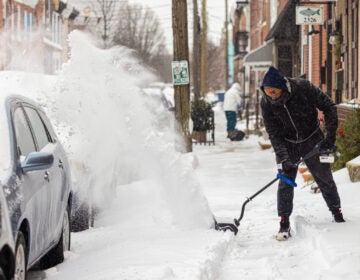Springside Chestnut Hill Academy president discusses sustainability efforts at school
Growing up, Dr. Priscilla Sands remembers picking blueberries for pie, earning 10 cents for correctly identifying species in John James Audubon bird prints and holding backyard woods explorations.
Those childhood memories are part of why Sands, president of Springside Chestnut Hill Academy, strives to incorporate similar out-of-class learning in sustainability and nature for students at the private school.
“You could read something in the text book, but you don’t know the applications to life and to the world around you,” she said. “Students getting their hands dirty and their feet dirty and actually doing this work reinforces it.”
As part of a Friends of the Wissahickon lecture series, Sands gave an overview Tuesday night of SCH Academy’s sustainability efforts over the past few years and what’s to come.
The school has practiced sustainability for the last two decades, Sands said. Recently, though, SCH Academy has further incorporated it into its curriculum and operations.
A focus on the outdoors
Each week, students are expected to spend a few hours in the woods working on green projects.
Activities include, among other things, planting native species to help reduce water runoff into the Wissahickon Creek, clearing surrounding trails of invasive plants and testing water quality.
Sands said students have planted over 225 native trees and 2,400 flowering bulbs in the area. They’ve also worked on trail restoration.
At least a few times a month, FOW executive director Maura McCarthy said her organization collaborates with students on projects to give them some of those hands-on educational experiences.
“Educational programs really are one of the main ways we can seed the next generation with thoughtfulness and a sort of community of action around environmental issues,” she said. “SCH Academy is an indicator of something that’s happening on a wider scale.”
A green plant
While the school has certainly added sustainable education to the curriculum, Sands said both operations and construction at SCH Academy have become more sustainable as well.
The school has a half-acre worth of solar panels thanks to a grant from the Department of Environmental Protection.
Most recently, sustainability has been incorporated into a multi-million dollar project that will bring a brand new set of athletic fields to the school, among other things.
Sands said $5.4 million of the project was put into the ground—literally.
Four water recharge beds, which slow down the rate at which water seeps back into the earth, were put under the field.
There’s also No-Waste Wednesdays where children pack lunches with less waste and compare it with other days of the week. There’s also what happens to the waste after lunch—the school purchased worm compost bins as a result of a 2005 Recycle Bank grant.
Recognition
The school’s committment to sustainability hasn’t gone unnoticed.
Earlier this year, the U.S. Department of Education named SCH Academy a Green Ribbon School.
“We’re only one of a handful in the country,” she said.
In the past few years, the school received a pair of grants aimed at sustainability.
The first, made available through Weavers Way and Recycle Bank, was awarded to redirect rainwater from downspouts into rain barrels.
The other grant, offered by Environmental Testing Associates, was given to test the water quality of the Wissahickon, a practice Sands said the school has been doing for two decades.
WHYY is your source for fact-based, in-depth journalism and information. As a nonprofit organization, we rely on financial support from readers like you. Please give today.




